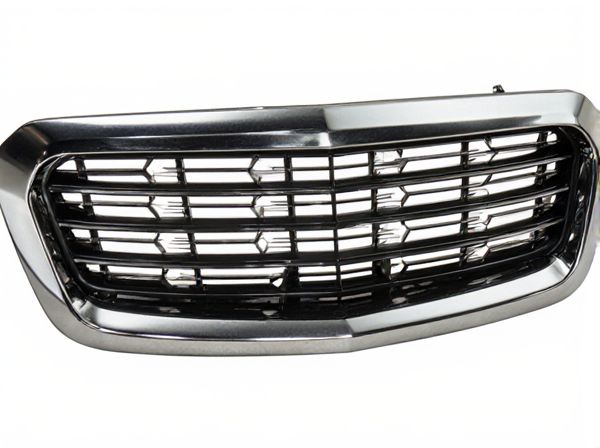
Photo illustration: ABS Plastic Grille vs Stainless Steel Grille
ABS plastic grilles offer lightweight durability and resistance to corrosion, making them ideal for budget-conscious applications where impact resistance is important. Stainless steel grilles provide superior strength, long-lasting rust resistance, and a sleek, polished appearance, perfect for heavy-duty or high-end use. Choosing the right grille depends on your priorities for cost, durability, and aesthetic appeal.
Table of Comparison
| Feature | ABS Plastic Grille | Stainless Steel Grille |
|---|---|---|
| Material | Acrylonitrile Butadiene Styrene (ABS) Plastic | High-grade Stainless Steel |
| Durability | Resistant to impact but can fade over time | Highly durable, corrosion and rust-resistant |
| Weight | Lightweight, improves fuel efficiency | Heavier, adds more weight to the vehicle |
| Cost | More affordable and cost-effective | Higher upfront cost due to premium material |
| Appearance | Smooth finish, easily customizable | Shiny, premium look with metal texture |
| Maintenance | Low maintenance, easy to clean | Requires regular cleaning to prevent stains |
| Weather Resistance | Good resistance but prone to UV damage | Excellent resistance to weather and UV rays |
Introduction to Grille Materials
ABS plastic grilles offer lightweight, corrosion-resistant, and cost-effective solutions ideal for automotive and HVAC applications with moderate mechanical stress. Stainless steel grilles provide superior strength, durability, and resistance to extreme weather and chemical exposure, making them suitable for heavy-duty environments and long-term use. Material selection depends on factors like budget, environmental conditions, and required lifespan.
Overview of ABS Plastic Grilles
ABS plastic grilles offer a lightweight, cost-effective solution featuring high impact resistance and excellent corrosion resistance, making them ideal for automotive and ventilation applications. Their thermal stability allows for consistent performance under varying temperatures, while the material's flexibility enables customized designs and easy installation. Compared to stainless steel grilles, ABS plastic grilles provide superior resistance to rust and chemical exposure but may have lower structural strength and durability in extreme conditions.
Overview of Stainless Steel Grilles
Stainless steel grilles offer superior durability and corrosion resistance compared to ABS plastic grilles, making them ideal for harsh environments and long-term use. Their robust construction ensures high impact resistance and a sleek, modern appearance that maintains integrity under extreme temperatures and UV exposure. Commonly used in architectural applications and ventilation systems, stainless steel grilles deliver enhanced strength and longevity with minimal maintenance requirements.
Durability and Lifespan Comparison
ABS plastic grilles offer lightweight corrosion resistance but are prone to cracking and fading over time, typically lasting around 5 to 7 years under harsh conditions. Stainless steel grilles provide superior durability, with excellent resistance to rust, impact, and UV exposure, often maintaining structural integrity for 20 years or more. The lifespan disparity makes stainless steel grilles a more cost-effective choice for long-term applications demanding high strength and weather resilience.
Aesthetic Differences
ABS plastic grilles offer a smooth, glossy finish that can be easily molded into intricate patterns, providing versatile design options for a modern and lightweight appearance. Stainless steel grilles feature a polished or brushed metallic surface, delivering a sleek, durable, and industrial aesthetic with a high-end appeal. The choice between ABS plastic and stainless steel grilles significantly impacts the overall visual impression, with ABS emphasizing color variety and flexibility while stainless steel enhances sophistication and longevity.
Installation and Maintenance
ABS plastic grilles offer lightweight installation with simple cutting and fastening methods, making them ideal for DIY projects and quick replacements. Stainless steel grilles require professional installation due to their heavier weight and the need for precision drilling or welding, ensuring a secure and durable fit. Maintenance of ABS plastic grilles involves occasional cleaning and checking for cracks, while stainless steel grilles demand regular polishing to prevent corrosion and maintain their sleek appearance.
Cost Analysis
ABS plastic grilles generally offer a lower upfront cost compared to stainless steel grilles, making them a budget-friendly option for automotive and HVAC applications. Stainless steel grilles, while more expensive initially, provide superior durability, corrosion resistance, and longer lifespan, potentially reducing replacement and maintenance costs over time. Factoring in lifecycle expenses, stainless steel grilles provide better long-term value despite higher initial investment.
Performance in Extreme Conditions
ABS plastic grille offers excellent resistance to corrosion, UV rays, and impact in extreme weather, making it ideal for environments with high moisture and temperature fluctuations. Stainless steel grille excels in strength, durability, and heat resistance, maintaining structural integrity under intense heat, heavy impacts, and harsh chemical exposure. Performance-wise, ABS plastic balances lightweight flexibility with weather resilience, whereas stainless steel provides superior long-term robustness and resistance to physical deformation in demanding conditions.
Environmental Impact
ABS plastic grilles have a lower carbon footprint during production compared to stainless steel grilles, as ABS requires less energy to manufacture. However, ABS plastic is less biodegradable and often contributes to long-term environmental pollution if not properly recycled. Stainless steel grilles offer superior durability and recyclability, making them a more sustainable choice for reducing waste and minimizing environmental impact over their lifecycle.
Conclusion: Which Grille Is Right for You?
ABS plastic grilles offer lightweight durability, cost-effectiveness, and resistance to corrosion, making them ideal for budget-conscious projects requiring moderate impact strength. Stainless steel grilles provide superior strength, longevity, and resistance to extreme weather or heavy impacts, suited for high-end applications demanding maximum durability and aesthetic appeal. Choosing between ABS plastic and stainless steel depends on priorities such as budget, environmental exposure, and desired lifespan.
 caratoz.com
caratoz.com